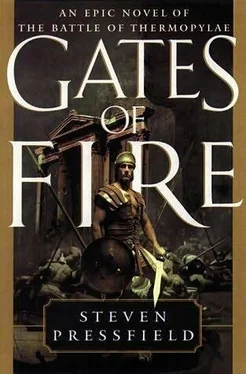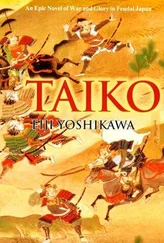Steven Pressfield - Gates of Fire - An Epic Novel of the Battle of Thermopylae
Здесь есть возможность читать онлайн «Steven Pressfield - Gates of Fire - An Epic Novel of the Battle of Thermopylae» весь текст электронной книги совершенно бесплатно (целиком полную версию без сокращений). В некоторых случаях можно слушать аудио, скачать через торрент в формате fb2 и присутствует краткое содержание. Жанр: Историческая проза, на английском языке. Описание произведения, (предисловие) а так же отзывы посетителей доступны на портале библиотеки ЛибКат.
- Название:Gates of Fire: An Epic Novel of the Battle of Thermopylae
- Автор:
- Жанр:
- Год:неизвестен
- ISBN:нет данных
- Рейтинг книги:3 / 5. Голосов: 1
-
Избранное:Добавить в избранное
- Отзывы:
-
Ваша оценка:
- 60
- 1
- 2
- 3
- 4
- 5
Gates of Fire: An Epic Novel of the Battle of Thermopylae: краткое содержание, описание и аннотация
Предлагаем к чтению аннотацию, описание, краткое содержание или предисловие (зависит от того, что написал сам автор книги «Gates of Fire: An Epic Novel of the Battle of Thermopylae»). Если вы не нашли необходимую информацию о книге — напишите в комментариях, мы постараемся отыскать её.
Gates of Fire: An Epic Novel of the Battle of Thermopylae — читать онлайн бесплатно полную книгу (весь текст) целиком
Ниже представлен текст книги, разбитый по страницам. Система сохранения места последней прочитанной страницы, позволяет с удобством читать онлайн бесплатно книгу «Gates of Fire: An Epic Novel of the Battle of Thermopylae», без необходимости каждый раз заново искать на чём Вы остановились. Поставьте закладку, и сможете в любой момент перейти на страницу, на которой закончили чтение.
Интервал:
Закладка:
How many in the advance party? Black Leon inquired of the elder.
He meant the forward force of Spartans that would, as always in advance of a mobilization, be dispatched to Thermopylae now, at once, to take possession of the pass before the Persians got there and before the main force of the allied army moved up.
You'll hear it from Leonidas tomorrow, the old man replied. But he saw the younger men's frustration.
Three hundred, he volunteered. All Peers. All sires.
My master had a way of setting his jaw, a fierce clamping action of the teeth, which he employed when he was wounded on campaign and didn't want his men to know how bad. I looked. This expression stood now upon his face.
An all-sire unit was comprised only of men who were fathers of living sons.
This was so that, should the warriors perish, their family lines would not be extinguished.
An all-sire was a suicide unit.
A force dispatched to stand and die.
My customary duties upon return from training were to clean and stow my master's gear and look to, with the servants of the mess, the preparation of the evening meal. Instead this day Dienekes asked Black Leon for his squire to do double duty. Myself he ordered on ahead, at a run, to his own home. I was to inform the lady Arete that the regiment had been dismissed for the day and that her husband would arrive at home shortly. I was to issue an invitation to her on his behalf: would she and their daughters accompany him this afternoon for a ramble in the hills?
I raced ahead, delivered this message and was dismissed to my own pursuits. Some impulse, however, made me linger. From the hill above my master's cottage I could see his daughters burst from the gate and dash with eager enthusiasm to greet him upon the way. Arete had prepared a basket of fruit, cheese and bread. The party was all barefoot, wearing big floppy sun hats.
I saw my master tug his wife aside beneath the oaks and there speak privately with her for several moments. Whatever he said, it prompted her tears. She embraced him fiercely, both arms flung tight about his neck. Dienekes seemed at first to resist, then in a moment yielded and clamped his wife to him, holding her tenderly.
The girls clamored, impatient to be off. Two puppies squalled underfoot. Dienekes and Arete released their embrace. I could see my master lift his youngest, Ellandra, and plant her pony-style astride his shoulders. He held the maiden Alexa's hand as they set off, the girls exuberant and gay, Dienekes and Arete lagging just a little.
No main-force army would be dispatched to Thermopylae; that tale was for public consumption only, to shore up the allies' confidence and put iron in their backbones.
Only the Three Hundred would be sent, with orders to stand and die.
Dienekes would not be among them.
He had no male issue.
He could not be selected.
Chapter Sixteen
I must now recount an incident of battle several years previous, whose consequences at this present juncture came powerfully to affect the lives of Dienekes, Alexandros, Arete and others in this narrative. This occurred at Oenophyta against the Thebans, one year after Antirhion.
I refer to the extraordinary heroism demonstrated on that occasion by my mate Rooster, Like myself at the time, he was just fifteen and had been serving, green as grass, for less than twelve months as first squire of Alexandras' father, Olympieus.
The armies' fronts had clashed. The Menelaion, Polias and Wild Olive regiments were locked in a furious struggle with the Theban left, which was stacked twenty deep instead of the customary eight and was holding its position with terrific stubbornness. To augment this peril, the foe's wing overlapped the Spartan right an eighth of a mile; these elements now began to wheel inboard and advance, taking the Menelaion in the flank. Simultaneously the enemy's right, which was taking the most grievous casualties, lost cohesion and fell back upon the massed ranks of its rearmen. The foe's right broke in panic while his left advanced.
In the midst of this melee Olympieus received a crippling lizard-sticker wound through the arch of the foot, from the butt-spike of an enemy spear. This came, as I said, at a moment of extreme dislocation upon the field, with the enemy right collapsing and the Spartans surging into the pursuit, while the foe's left wheeled in attack, supported by numbers of their cavalry coursing uncontested across the broken field.
Olympieus found himself alone upon the open gleaning ground to the rear of the enrolling battle, with his foot wound rendering him crippled, while his cross-crested officer's helmet provided an irresistible target for any would-be hero of the enemy's ranging horse.
Three Theban cavalrymen went after him.
Rooster, unarmed and unarmored, sprinted headlong into the fray, snatching a spear from the ground as he ran. Dashing up to Olympieus, he not only employed his master's shield to protect him from the missile weapons of the enemy but took on the attacking horsemen single-handedly, wounding and driving off two with spear thrusts and caving in the skull of the third with the man's own helmet, which he, Rooster, in the madness of the moment, had torn off the fellow's head with his bare hands as he simultaneously ripped him out of his seat. Rooster even succeeded in capturing the handsomest of the three horses, a magnificent battle mount which he used in the aftermath to draw the Utter which evacuated Olympieus safely from the field.
When the army returned to Lakedaemon after this campaign, Rooster's exploit was the talk of the city. Among the Peers his prospects were debated at length. What should be done with this boy?
All recalled that though his mother was a Messenian helot, his father had been the Spartiate Idoty-chides, Arete's brother, a hero slain in battle at Mantinea when Rooster was two.
The Spartans, as I have noted, have a grade of warrior youth, a stepbrother class called a mothax. Bastards like Rooster and even legitimate sons of Peers who through misfortune or poverty have lost their citizenship may be, if deemed worthy, plucked from their straits and elevated to this station.
This honor was now proffered to Rooster.
He turned it down.
His stated reason was that he was already fifteen. It was too late for him; he preferred to remain in service as a squire.
This rejection of their generous offer enraged the Peers of Olympieus' mess and created an outrage, as much as the affair of a helot bastard could, within the city at large. Assertions were made to the point that this headstrong ingrate was notorious for his disloyal sentiments. He was a type not uncommon among slaves, prideful and stubborn. He sees himself as Messenian. He must either be eliminated, and his family with him, or secured beyond doubt of betrayal to the Spartan cause.
Rooster eluded assassination at the hands of the krypteia that time, largely due to his youth and to Olympieus' intercession, man-to-man among the Peers. The affair faded for the moment, rekindling itself, however, upon subsequent campaigns when Rooster again and again proved himself the boldest and most valorous of the young squires, surpassing all in the army save Suicide, Cyclops, main man of the Olympic pentathlete Alpheus, and Polynikes' squire, Akanthus.
Now the Persians stood at the threshold of Greece. Now the Three Hundred were being selected for Thermopylae. Olympieus would be prominent among them, with Rooster at his shoulder in his service. Could this treasonous youth be trusted? With a blade in his fist and himself a handbreadth from the polemarch's back?
The last thing Sparta needed at this desperate hour was trouble at home with the helots. The city could not stand a revolt, even an abortive one. Rooster by this time, aged twenty, had become a force among the Messenian laborers, farmers and vineyardmen. He was a hero to them, a youth whose courage in battle could have been exploited by him as a ticket out of his servitude. He could be wearing Spartan scarlet and lording it over his mean-birthed brothers. But this he had disdained. He had declared himself Messenian, and his fellows never forgot. Who knows how many of them followed Rooster in their hearts? How many absolutely vital craftsmen and support personnel, armorers and litter bearers, squires and victualry men? It is an ill wind, they say, that blows no one good, and this Persian invasion could be the best thing that ever happened to the helots. It could spell deliverance. Freedom. Would they stand loyal? Like the gate of a mighty citadel which turns upon a single tempered hinge, much of the Messenian sentiment focused its attention upon Rooster and stood ready to take its cue from him.
Читать дальшеИнтервал:
Закладка:
Похожие книги на «Gates of Fire: An Epic Novel of the Battle of Thermopylae»
Представляем Вашему вниманию похожие книги на «Gates of Fire: An Epic Novel of the Battle of Thermopylae» списком для выбора. Мы отобрали схожую по названию и смыслу литературу в надежде предоставить читателям больше вариантов отыскать новые, интересные, ещё непрочитанные произведения.
Обсуждение, отзывы о книге «Gates of Fire: An Epic Novel of the Battle of Thermopylae» и просто собственные мнения читателей. Оставьте ваши комментарии, напишите, что Вы думаете о произведении, его смысле или главных героях. Укажите что конкретно понравилось, а что нет, и почему Вы так считаете.












